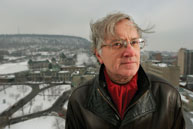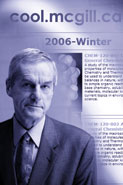Headliners: Making sense of Dawson tragedy
Headliners: Making sense of Dawson tragedy McGill University
User Tools (skip):
Headliners
Making sense of Dawson tragedy
Voice of reason
In the wake of the tragic events at Dawson College on September 13, the media sought the commentary of numerous McGill experts on issues ranging from security at schools to the monitoring of websites. Amid the swirl of wild speculation and conjecture that often follows such incomprehensible tragedies, the calm voice of Michael Hoechsmann, an Education professor, stood out like a clarion. In interviews for print and electronic media, Hoechsmann noted that there is no evidence that bloody video games, as tasteless as they may be, encourage violence. He also remarked that linking the hairstyles, piercings and the other trappings of the Goth culture to heinous acts such as this is a "dubious proposition."
Weathering the storm

Stewart tracking the wind, hail and sleet.
Owen Egan
Extreme weather wrangler Ron Stewart was front and centre in a recent edition of the Edmonton Journal. Stewart, a professor in the Department of Atmospheric and Oceanic Studies, was interviewed about his Storm Studies in the Arctic project that aims to make predicting the weather in the Great White North more reliable. Currently, the weather forecasts for communities in Nunavut are produced almost 3,000 kilometres away in Edmonton and are notoriously inaccurate — a dangerous situation in a region where people travel mostly by boat and snowmobile. Speaking of dangerous situations, as part of the study, Stewart and his colleagues will fly small planes directly into the teeth of the worst storms they can find in order to measure wind velocity, temperature and moisture.
One Harpp that won't be played

Harpp using math to nab the cheats.
Claudio Calligaris
David Harpp's words of wisdom graced the pages of the Dallas Morning News in a feature about the rise of cheating among students in the Lone Star State. For the past 15 years the chemistry professor has been using a mathematical formula of his own devising to nab McGill students who steal answers from others during exams. Harpp's method has proven to be so successful that the university uses it for all multiple-choice finals. Inspired by Harpp's results, Texas officials will soon begin using similar techniques to catch the cons in their student population.

